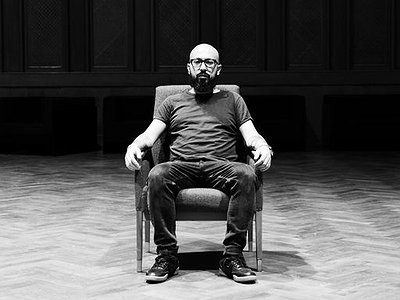Part 2
Collaborations can take on many forms. What role do they play in your approach and what are your preferred ways of engaging with other creatives through, for example, file sharing, jamming or just talking about ideas?
Well it all starts in general – but not always - with other collaborative projects with a relationship between me and the other person involved. We talk about the idea and I see what feeling and perspective we come to. Jamming, in general, is an aspect that concerns live concerts but sometimes it’s something I use to achieve a draft/sketch. But in times like this, file sharing is the only way.
Could you take us through a day in your life, from a possible morning routine through to your work? Do you have a fixed schedule? How do music and other aspects of your life feed back into each other - do you separate them or instead try to make them blend seamlessly?
I don’t have a fixed schedule for my work but I’m really lucky because my studio is in front of my house. So if I wake up during the night with an idea and feel inspired I can jump in the studio.
I prefer to be in the studio at night, I feel more comfortable, less distracted, there’s different smells, atmosphere and vibe. I’m more of “a normal time schedule person” when I have a client in the studio, and I drink a lot more coffee.
During the day, I walk my dogs. I live by the beach and the hills, so I try to spend time with nature, this helps me to live a good life and feel inspired.
Could you describe your creative process on the basis of a piece or album that's particularly dear to you, please? Where did the ideas come from, how were they transformed in your mind, what did you start with and how do you refine these beginnings into the finished work of art?
A few years ago, I worked on the realization of the music of a theatre production titled "Anatomy of Fear". The performance explored how fear shapes an individual’s personality and influences collective behaviour. In this case, I did some research with the creator of the show on fear and phobias and we used images of Francis Bacon. I visited his works in the gallery trying to identify with it, I also read books on the subject of fear and I recorded screams and field recordings. All of these things helped me create the right mood and sound to begin the composition.
There are many descriptions of the ideal state of mind for being creative. What is it like for you? What supports this ideal state of mind and what are distractions? Are there strategies to enter into this state more easily?
It seems that the more I suffer the more creative I am. The problem then is to find the strength to put it to music. And when I’m calm and have the strength to go to the studio I’m not always in the correct “state of mind”.
How is playing live and writing music in the studio connected? What do you achieve and draw from each experience personally? How do you see the relationship between improvisation and composition in this regard?
The experience in the studio is completely different from playing live. In the studio, you have intimacy and time to stop and think but sometimes it’s boring and satisfaction isn’t guaranteed. Whereas live, I have a different approach because I absorb the energy of the audience - whether positive or negative – and sometimes beautiful magic happens. Connection and sharing emotions in those moments with other human beings is eternal!
How do you see the relationship between the 'sound' aspects of music and the 'composition' aspects? How do you work with sound and timbre to meet certain production ideas and in which way can certain sounds already take on compositional qualities?
I don’t see a proper difference, sound it’s a starting point of a composition
Our sense of hearing shares intriguing connections to other senses. From your experience, what are some of the most inspiring overlaps between different senses - and what do they tell us about the way our senses work? What happens to sound at its outermost borders?
I don’t know what to say concerning this question. Without thinking too much, I’d say that the brain is such a complex world and yet we have such a firm limit in terms of the frequencies we can hear. I’m convinced that we still have to learn a lot as a species. We are so absorbed with daily noise and we don’t listen to the call of the sound of our planet. I’m trying to educate myself and open my mind by exploring more about my hearing sense.
Art can be a purpose in its own right, but it can also directly feed back into everyday life, take on a social and political role and lead to more engagement.Can you describe your approach to art and being an artist?
I like to think that maybe one day with art we could save the world. As artists, we have a very important task which is to impart values and to make sense of the world.
It is remarkable, in a way, that we have arrived in the 21st century with the basic concept of music still intact. Do you have a vision of music, an idea of what music could be beyond its current form?
Music allows us to connect with ourselves. As long as there is wind, sea and fire - there will always be music - just as sound started, one day it will return to its own dawn.





